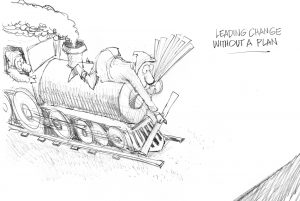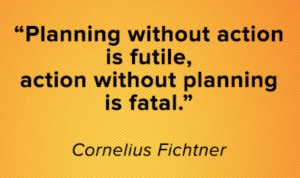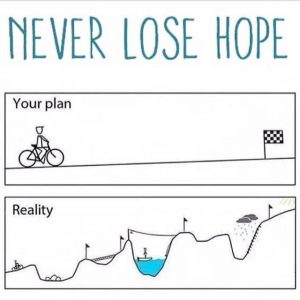Strategy #3 Put an Action Plan in Place
Organizations have lots of plans – long-term strategic plans, annual operating plans, plans for each division, etc. You only need one plan because you can have some long-term goals and some short-term goals in the same plan. You can keep it simple and you can craft it to fit your needs, but the difference between having a simple plan and not having a plan at all is dramatic.
“Planning is bringing the future into the present so that you can do something about it now.”
Alan Lakein, How to Get Control of Your Time and Your Life
The Hidden Challenge of Plans – They Are a Set of Commitments
Making a plan is a key part of being the author of your life. The sneaky challenge is that you must:
- Decide what is important
- Commit to action in a period of time
- Do it – act and persevere – “hold the course.”
This is being the author in word and action.
In business, people plan together. As a teenager, it would also be useful to plan with others. You might all be working on your own plan, but you would enrich each other’s plans significantly.
Basic Elements of a Plan
Plans come in all kinds of formats. There is no single “right way” to create your plan. The following four elements will give you a good foundation and you can add any other elements you like.
1. Your Goals – what do you want to achieve, create, become?
For goals that might take a long time, you can add interim goals (milestones along the way). You can add definition to your goals by defining how you would know if you had achieved the goal (sometimes that’s useful and sometimes the goal is clear enough by itself).
2. Key Strategies/Actions – what will you actually need to do in order to achieve your goal?
A goal may only require a few actions, but other goals may require a bunch of actions.
3. Your Timeframes – when will you start and by when do you want to achieve your interim goals or final goals?
This can vary a great deal from goal to goal and sometimes you find that you have to extend the date, so don’t worry if that happens (unless it happens too much). The most important part is starting.
4. Your Supporters – who can help you reach your goals?
Remember, heroes don’t go alone. Adults pursuing corporate goals also need supporters, so get used to creating a web of support.
That’s about as simple as it gets, but simple is good in most cases. Once you have started planning you will probably find that you keep discovering ways to improve your plan and make it more useful. There are other elements you can put in a personal plan, such as resources required or barriers to remove, but the four that are noted cover most of the territory most of the time.
A good plan today is better than a perfect plan tomorrow.
Proverb
Five Keys to a Plan Worth Having
1. Just Do It – the process of planning is as important as the plan
Planning is a form of thinking – assessing, thinking about possible actions, making choices and committing, timing and sequencing actions, etc. Planning is just a way to guide thinking and set up for effective actions.
2. Make it Yours – Make it what you want
Planning is a way to be the author of your life – to gain influence over what happens in your life. It should be about what you want in the vast majority of cases. There will always be some things that other want you to do or require you to do – that’s life – but most planning should be focused on what you want – being the author of your life.
3. Keep it Simple – don’t over-plan
Plans do not need to be big and complex and fancy. Simple is often best. If you find you need more detail, then add it, but start simple. And don’t worry about whether it is a perfect plan. An OK plan today is better than a perfect plan next month.
4. Give it Life – feed it attention & energy
If you followed the first three guidelines, then you probably have a plan or plans worth investing in. So, invest some time and energy and see where it takes you. Give your plan some life. Act on it. And revise your plan as you progress and learn and encounter new experiences in order to keep it fresh.
5. Persevere & Keep it Flexible – life will intrude
Usually the pattern is that we plan, then reality intrudes and blows up the plan and we have to revise the plan – usually more than once. Having a good plan is important, even if reality interferes and we have to change it. What is equally important is our ability to learn from experience and refine our plan as we go.
Your initial timing may have been unrealistic, you may have missed something that helps or hinders your plan, new factors may appear, you may hit an unforeseen barrier or pitfall, etc. You can also hit spots where you get frustrated or tired or discouraged and in those spots, it’s a matter of simply putting one foot in the other until you get through the tough spot.
Remember
- This is for you
- This is about you being the author and creating your life
- This is to guide you in reflecting on your life and what you can do.
- This is not about complying with adult expectations
- This is about determining where to put your focus and energy in order to get what matters most to you
- This is important in your adult years also
The greatest danger for most of us is not that our aim is too high and we miss it, but that it is too low and we reach it.
Michaelangelo

Examples of Goals & Actions in a Plan |
These are Just ExamplesThere are a few examples here just to give you an idea of the kinds of goals you might come up with. Some are simple and some are more complex. With each goal is an idea of how you might know how well you are doing. Then there is a column for strategies/actions as well as one to get a sense of timing. Be careful with timing as you don’t want to be doing too many things at the same time. There is also a column for support – who can support you in pursuing your goal. These are simple examples, but simple is fine. “Have a bias toward action – let’s see something happen now. You can break that big plan into small steps and take the first step right away.” Indira Gandhi |
My Goal |
Strategies/Actions |
Timing |
Support |
#1Develop my listening skills(Feedback from people I trust about my improvement) |
Read the section on listening skills in the Relationship Chapter
Choose a couple of people to practice with and practice whenever we are together until it is a natural part of our relationship Commit to effectively listening to my friends, teammates, classmates, until it becomes a natural part of my relationship skills Commit to effectively listening to my family members (when I am ready this year) |
||
#2Learn to play the guitar(Feedback from my teacher or those I play with) |
Talk to 3-5 people about how to go about learning the guitar, particularly good teachers and classes
Explore the suggestions people had and choose an approach, teacher, class & how to get a guitar – and how to pay for it Start classes or lessons “Learn to love the plateau” – persevere in the face of frustration and use the experience to understand the mastery process |
||
#3Do better in math(Raise my grade from a D to a C this semester) |
Find one person to partner with in getting better – study partner or someone who could coach me
Start talking weekly with my teacher to get questions answered, catch up or get ahead Add another person to my “study group” |
||
#4Develop a strong sense that I am a person of significance(My assessment – how I see my significance growing) |
Pick up litter in my neighborhood (do it weekly) Start using social media to briefly affirm others – one brief comment to a person per day (people I know, people whose work I admire, etc.)Start doing my own laundry weeklyCreate my vision and heroic code to guide and affirm my behavior (when I am ready this year)Learn a skill that (a) supports others, like first aid, peer counseling, or working with disabled kids or (b) that would enable me to build or fix things |
||
#5Join a group
|
Make a list of possible groups – do some research, talk to 3-5 people to get their input
Target 2-3 possible groups and identify what I would get out of joining and what I might contribute Join a group Join a second group |
Your Plan Will Support You in What’s Important to You
A Plan Doesn’t Run or Control Your Life
It guides it. Not everything goes according to a plan and a lot of the time, you won’t think of your plan. But creating your plan makes a big difference and reflecting on your plan and how you are doing also makes a big difference.
Creating your plan is the critical step because it means that you have focused on what’s important to you and committed to actions to reach your goals. Once you have created your plan, it will start working for you. Sometimes you will focus on your plan a lot and other times you won’t.

“How am I Doing?”
If you ask yourself that question every couple of weeks or every month, you will probably stay on track. Remember, that the journey is not a straight path and sometimes you will find yourself highly successful in pursuing your goals and other times you will be disappointed. Expect that and just keep moving forward.
Remember the three simple questions to ask yourself informally. Don’t make too big a deal of this. Just ask the questions and see where they guide you. These question work for an individual. They work even better if you share with others and talk with others about your experience pursuing your vision.
- What are little wins to celebrate?
- What have I learned (about myself, about others, about life, etc.)?
- What do I want to keep doing, start doing or stop doing?

Your present circumstances don’t determine where you can go; they merely determine where you start
Nido
Qubein